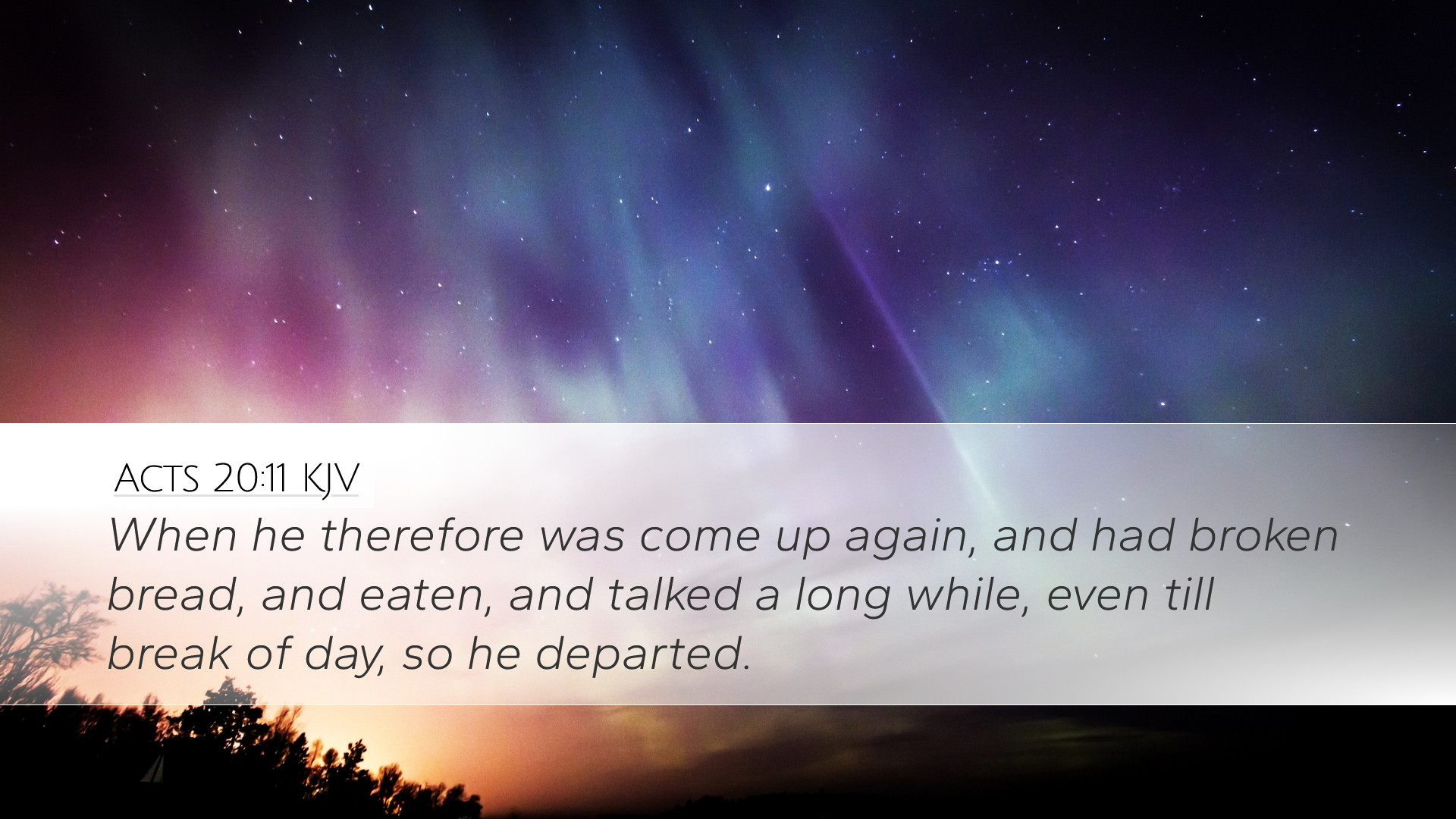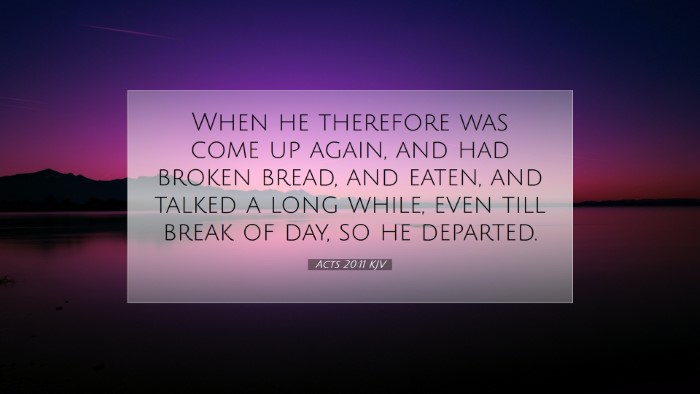Commentary on Acts 20:11
Acts 20:11 states: "And when he had gone up and had broken bread and eaten, and talked a long while, even till break of day, so he departed." This passage provides a rich tapestry of theological insights and practical applications for believers and leaders in the church. Exploring the details through the lenses of public domain commentaries reveals depth and significance in this seemingly simple account.
Context and Background
The setting of this verse is crucial to understanding its implications. The Apostle Paul is traveling and ministering in Troas, a place where he had previously preached the Gospel and established a church. This narrative demonstrates not only Paul’s commitment to preaching but also highlights the early church’s practices of worship, fellowship, and teaching.
Insights from Matthew Henry
Matthew Henry emphasizes the importance of the preaching of the Word as central to the life of the early church. He notes that this incident occurred during a time of communal gathering, which underscores the significance of breaking bread together. According to Henry, this event illustrates a key aspect of Christian fellowship—sharing meals—and signifies the communion of the body of Christ. It also highlights Paul's dedication as a minister who would preach tirelessly for the edification of the saints.
Furthermore, Henry discusses the miraculous nature of Eutychus's resurrection. This miracle serves as a reminder of God's power over death and the hope believers have in Christ. Henry calls attention to the message of resurrection that the early church celebrated, illustrating God's sovereignty and the promise of eternal life.
Insights from Albert Barnes
Albert Barnes offers a detailed commentary on the actions of both Paul and Eutychus. He points out that Eutychus's fall can be seen as a cautionary tale regarding the dangers of becoming inattentive during worship and teaching. Barnes observes that the young man’s physical position—sitting in a window—symbolizes the precarious balance between the world and spiritual engagement. He stresses the importance of being fully present during the proclamation of the Word, which is essential for spiritual growth.
Barnes also highlights the long nights of teaching that characterized early church gatherings. He suggests that such dedication to the Word should inspire modern believers to prioritize regular participation in Sunday services and midweek gatherings, creating a culture of learning and engagement with Scripture.
Insights from Adam Clarke
Adam Clarke provides a broader look at the significance of breaking bread in the context of Acts 20:11. He emphasizes that the action describes the communal aspect of the early church where meals were often inclusive of spiritual teaching. Clarke notes that the act of breaking bread goes beyond mere sustenance; it is deeply emblematic of Christian unity and shared faith.
Clarke particularly points out how Paul’s willingness to continue speaking until daybreak demonstrates a deep passion for instructing believers. It serves as a model for contemporary ministers who are called to pour out their lives in service to the church. Clarke's analysis reminds us that true dedication to ministry may sometimes require self-sacrifice and endurance for the sake of nurturing others in their faith.
Theological Reflections
This account in Acts 20:11 speaks volumes about the nature of community in the church. Combining insights from Henry, Barnes, and Clarke, it becomes evident that the early church exemplified unity, shared learning, and the importance of the sacraments in their gatherings. The miraculous event surrounding Eutychus's fall and restoration serves as a powerful testament to God’s grace operating within the expectations of His people.
The resurrection of Eutychus illustrates the pervasive theme of life overcoming death, a core message of the Gospel itself. Eutychus’s physical revival can mirror the spiritual revival that occurs when individuals respond to the Word of God. This account encourages pastors and church leaders to recognize their role as catalysts for spiritual awakening and growth.
Practical Applications
-
Upholding the Importance of Worship: This passage reminds church leaders of the necessity of prioritizing worship and teaching in church life. Regular gatherings foster community, nurture faith, and enable believers to engage more deeply with Scripture.
-
Teaching with Passion: Paul’s example encourages pastors to communicate God’s Word with fervor and dedication. The commitment to proclaiming the Gospel at all times is essential for a thriving church.
-
Encouraging Presence in Meetings: Eutychus's experience serves as a reminder of the need for attentiveness amid distractions. Believers should be encouraged to remain engaged during sermons and teachings, understanding that they are receiving spiritual nourishment.
-
Emphasizing the Power of Resurrection: The miraculous resurrection of Eutychus can be an opportunity to teach about the hope of eternal life. Pastors can draw parallels between physical and spiritual resurrections to instill greater faith in their congregants.
Conclusion
Acts 20:11 encapsulates fundamental themes of early Christian community, the vitality of Word-centered teaching, and the hope we possess in Christ's resurrection. The insights gleaned from Matthew Henry, Albert Barnes, and Adam Clarke provide established yet ever-relevant truths to guide pastors, students, theologians, and scholars. The legacy of such gatherings continues to shape the worship life of the church and calls for renewed commitment to the core practices of faith.


